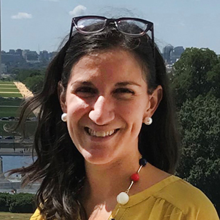February 2018 Spotlight on the SRCD Policy Fellow: Francesca Longo, Ph.D.
2017-2018 Federal Executive Branch Policy Fellow
Since fortuitously taking a course on child development and public policy as an undergrad studying abroad in Florence, Italy, I knew that was the career for me. I had always been interested in policy and psychology, but did not want to go into political science, so I decided to pursue studies in psychology. This course was revelation that I could do both. Not too long after, I learned about the SRCD Policy Fellowships, and I knew immediately that I wanted to be a Fellow. A doctoral member of my undergraduate lab became a Fellow, and her stories about working at the intersection of child development and public policy were fascinating.
Fast forward through 4 years of work and 7 years of graduate school, and my dreams finally came true! I became an SRCD Congressional Fellow, and I could not wait to move to DC to start my new life on the Hill. After a daunting 3-week orientation and interview process, I was finally ready to start my fellowship year in the office of Senator Kirsten Gillibrand. With a connection to New York and the Senator’s passion for issues related to families and children, I knew it would be a great fit. I have a lot of flexibility within the office, and they have been open to me participating in a wide range of duties. I get to take constituent meetings, write letters, draft briefing questions, and contribute to and draft several pieces of legislation on a wide range of topics from SNAP to child welfare.
Even with my prior policy experience working at MDRC, transitioning from academia to policy proved difficult at first. I had to accept the fact that I would not be able to write a comprehensive 20-page memo when my supervisor asked me for a blurb on child abuse prevention. I had to accept the fact that there are some issues that are politically off-limits to write legislation on because either someone “owns” that topic or because it is tricky for a particular state. I had to accept the fact that things work at a very different pace – we may have great solutions to a problem, but if the timing is not right, we want to wait; or when a specific issue becomes particularly relevant, sometimes all hands have to be on deck.
Thanks to this last point, I have learned so much about topics outside of my area of expertise – Puerto Rican healthcare, FDA regulations, SNAP, apprenticeship and higher education, taxes, defense, and immigration to name a few – and I love it. With all of these new topics, one of my favorite questions to try to answer for myself has become, “So what does this mean for children and families?” Some answers are easy to see – low-income children need money for food because it is important for their health, behavior, and academic achievement; and immigrant and temporary protected status Spotlight on the SRCD Fellow family separation is detrimental to child development. Some answers took me a bit longer to see – how FDA regulates medical devices impacts family planning; and changing tax laws impact money for schools and how much money families have to spend on their children.
After about 4 months, I am happy to report that I finally feel like I can speak the same language as my coworkers! More than just understanding the alphabet soup, I can see how politics, policy, and procedure interact. The first time I came out of a meeting knowing exactly how to provide my boss with a plausible solution to the problem was so satisfying. It is now so much easier to see how my expertise in applied developmental and educational psychology can be used to further the policy efforts of my office.
I am so grateful to SRCD for this opportunity to be able to help children and families on such a large scale. I will be very sad when this year is over!
